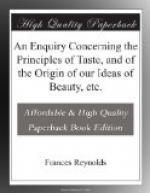The perception of the charms of the agreeable seem to be wrought up to excellence by the operation of our own powers. We ourselves have blended its beauties and defects into the sentiment of beauty, pleasure; and hence, probably, the strength and durability of the passion which it creates. Beauty, on the contrary, is composed to our hands, full, perfect, and intire; its idea is also a compound of the common and the uncommon, being at once like and unlike the general form; but inherently it has no contrast, and therefore affords no recreation, no pleasing exercise, to the mental faculties; there is nothing to re-create, nothing to wish; and hence the instability of the passion which it inspires. Perfect beauty is, like perfect happiness, lost as soon as it is attained.
It is, I imagine, to the principles of the masculine and the feminine character, that we owe the perception of beauty or taste, in any object whatever, throughout all nature and all art that imitates nature; and, in objects which differ from the human form, the principles must be in the extreme, because the object is then merely symbolical. Thus, the meekness of the lamb, and the high-spirited prancing steed; the gentle dove, and the impetuous eagle; the placid lake, and the swelling ocean; the lowly valley, and the aspiring mountain. It is the feminine character that is the sweetest, the most interesting, image of beauty; the masculine partakes of the sublime. Thus it will be found, that, in every object that is universally pleasing, there exist principles which are analogous to those that constitute beauty in the human species; and that its appearance does always, in some degree, move the affections, though the mind may be unconscious of its similitude to any idea in which the affections are concerned. But the test of the object’s possessing the principles of beauty is when we are able to assimilate its appearance with some amiable interesting affection; and, according as that affection prevails in the breast of the spectator, it will appear with an additional power of pleasing.
From association of ideas, any object may be pleasing, though absolutely devoid of beauty, and displeasing with it. The form is then out of the question; it is some real good or evil, with which the object, but not its form, is associated.
It is observable, that those animals I have mentioned (and I imagine all animals that are symbolical of our affections have the same) have a double character of beauty, or reference to the affection that is moved: i.e. their form and their disposition, exactly corresponding with each other. Probably on that union depends their power of pleasing; their form alone, so different from human beauty, could not sufficiently engage the attention, or afford the interesting perception, which the consistency of truth does, in the intire of an object.




